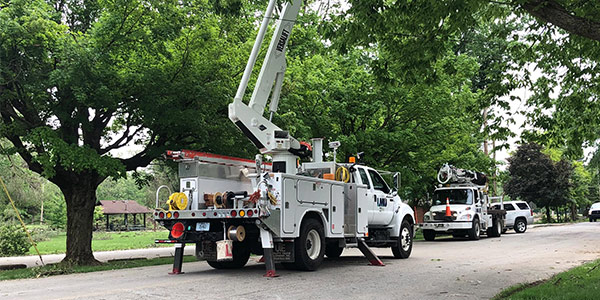FERC ruled last week that generating facilities that are not online and producing energy must pay for their station power at retail rates subject to state jurisdiction and directed PJM to consider changing its Tariff accordingly (EL20-30).
The commission said an offline generator that requires power to operate its lighting, air conditioning and other facilities “is consuming electricity as an end user and thus, consistent with the boundaries of the commission’s jurisdiction under the [Federal Power Act], the provision of station power is a retail sale subject to state jurisdiction.”
The commission’s ruling came in response to a complaint filed by Lawrenceburg, Ind., and the Indiana Municipal Power Agency against the RTO, American Electric Power Service and Lawrenceburg Power seeking to void the power self-supply monthly netting provisions of the RTO’s Tariff.
The city’s Lawrenceburg Municipal Utilities has an exclusive franchise for supplying electricity within city limits and says Lawrenceburg Power’s 1,160-MW combined cycle plant in the city must take station power service from the city because Indiana law does not allow it a choice of retail supplier. The plant is interconnected with AEP transmission facilities under PJM’s operational control.
FERC approved the netting rules in 2001, saying station power can be supplied to a generating plant in three ways: on-site self-supply (from behind-the-meter generation); remote self-supply (from another generator owned by the same company); or third-party supply.

| Lawrenceburg Municipal Utilities
While the commission disclaimed jurisdiction over the supply of station power, it rejected the petitioners’ request for a declaratory order finding the station power monthly netting provision in section 1.7.10(d)(i) of the PJM Tariff null and void.
Instead, FERC instituted a new proceeding, requiring PJM to propose changes to its Tariff consistent with the order or show cause why changes are not necessary (EL20-56). The RTO has 60 days to respond.
FERC said PJM’s proposed revisions should clarify that the monthly netting provision in section 1.7.10(d)(i) “does not determine whether a retail sale of station power has occurred in that month.” It also said Tariff provisions should clarify that PJM has no responsibility for the determination of any state-jurisdictional retail rates.
“Because the PJM Tariff’s self-supply monthly netting provision can be read to — and indeed has been relied on by certain PJM generators to assert the right to — determine whether a retail sale of station power has occurred and avoid the retail purchase of station power, which is inconsistent with the commission’s jurisdiction, we find that PJM’s Tariff may be unjust, unreasonable, unduly discriminatory or preferential,” FERC said.
Lawrenceburg Power told FERC that Lawrenceburg Municipal Utilities has attempted to charge the generator a minimum of $845,000 annually “even if Lawrenceburg Power does not consume any station power in the entire year” and that it prefers self-supplying its station power under the PJM Tariff.
“Arguments about the justness and reasonableness of the retail rates, and about what entity within the state of Indiana has authority to provide retail service, are more appropriately raised before the relevant state regulatory body,” FERC said. “The commission does not have the authority to determine when, and on what terms, a retail sale of station power is made.”
The ruling is likely to have impacts on other merchant generators.
Among the intervenors in the case were Buckeye Power, which said it and one of its member cooperatives, Washington Electric Cooperative (WEC), are involved in a dispute with Waterford Power, a merchant generator located within WEC’s service territory, regarding WEC’s right to supply Waterford’s station power.



